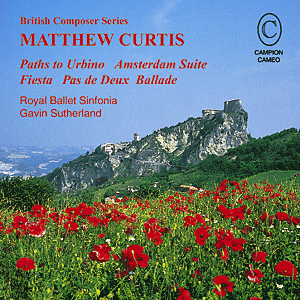Campion have chosen well with Curtis who, for the first time,
has a complete disc given over to his music. Curtis speaks directly to
his audience. He is tuneful, a skilled orchestrator and rhythmically captivating,
These qualities leap out at you from the loudspeakers straight off with
the first flourishes of his Fiesta, a concert overture which fits
well into the brilliant British overture pattern. The work has Walton's
snappy vigour (Johannesburg Festival, Capriccio Burlesco and
the two concert marches), the jazziness of Constant Lambert's Rio Grande
and a lilting inventive quality that reminds me of Rimsky's Antar.
Other works which may cross your mind as you listen to this include Chagrin's
Helter-Skelter and Howard Ferguson's Overture to a Celebration.
This makes a cracking start to the disc declaring also the excellence
of the close-up recording; a consistent delight.
The three movement Amsterdam Suite comprises
an agreeably bumptious grand waltz (compare Barber's Souvenirs)
called Barrel Organs, a softly intoned saxophone soliloquy (Lonely
City) warmly played by Kyle Horch and an unmistakably Coatesian
scatty burlesque (Trams and Crowds). The Coates bustle rustles
away through Curtis's Outward Bound as well. The lone Pas
de Deux was Curtis's first piece to be broadcast in 1983. It has
important solos for oboe and bassoon and a warm cocooned sound - a little
like Rota's film music for Romeo and Juliet.
Then comes Curtis’s symphonic suite Paths to Urbino
with a riotously celebratory prelude (Havana rather than Naples!),
the Tchaikovskian pilgrims' march (Abbey in the Hills) and in
the simply glorious Music of the Fields a tenderly sunny Rachmaninovian
melody plays like holiday sunshine with falling flute arabesques recalling
the Moeran symphony. Journey's End is a brilliantly impatient
Rossinian tarantella.
The Ballade - the first of the Two Pieces
- is short and introit-like written for solo violin and orchestra.
How sad that it has been 'untimely ripped' from the flanking movements
of its original home - the Three Humoresques in which format
it was broadcast in 1993. Think here in terms of Bruch and Finzi. Its
stable-mate, Haunted Woods is an orchestral elaboration of a
Curtis partsong to words by the poet Anne Harris. The theme sounds a
little like Elgar's funeral march from the Second Symphony. Curtis has
set thirty of Harris's poems.
The notes, in English only, are by the composer and
by Curtis's long-time and dedicated advocate Michael Rostron. Curtis's
supporters include Adrian Smith, the audacious, bright-eyed, enterprising
and valiant conductor of the Slaithwaite Phil in the North-East of England.
No orchestra and conductor have performed so many Curtis pieces and
they have done so stylishly and with warm engagement. I should also
mention the conductor-doyen of the BBC Concert Orchestra, Ashley
Lawrence. He presided over Curtis's earliest BBC broadcasts including
the Pas de Deux, Romanza, Rondo Brillante and Open
Road all featuring in Lawrence’s ‘Matinee Musicale’ programme.
Fortunately more recordings of Curtis are in the offing
from ASV in the shape of the Serenade for Strings and the overture
Open Road.
A superb disc and one in which the composer and all
involved must have taken exuberant joy ... and so do we. Snap it up
and make a major light music discovery - rapturously engaging music.
Soon you will be adding anything by Curtis to your wantlist.
Rob Barnett


